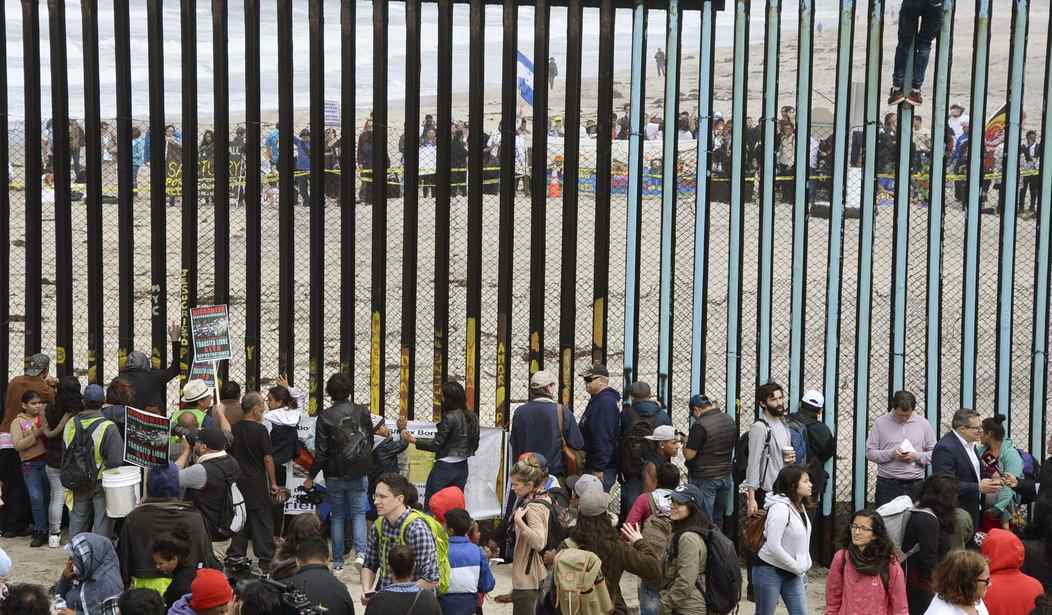There is a tradition within Judaism that all actions in the world can be viewed through the lens of the Torah reading of the week. Based upon that premise, each of these columns are to help us understand the politics of the world through a biblical lens.
The challenges with illegal immigration are recognized on both sides of the political aisle, and the statistics about crime from illegal aliens is staggering. Although only constituting seven percent of the U.S. population, non-citizens accounted for 64% of all federal arrests in 2018: 24% of all federal drug arrests; 25% of all federal property arrests; and 28% of all federal fraud arrests (according to Justice Department’s Bureau of Justice Statistics). But what does the Bible teach us about immigration, and the legalities, behavior, and necessary actions that go along with it?
Liberal clergy often like to cite that the most repeated commandment in the Torah is to treat the stranger with respect and caring. “You will love the stranger as yourself, for you were strangers in the land of Egypt” (Lev. 19:34). There is no disputing this biblical commandment, and there are many theologians for thousands of years who have claimed that this is not only the most often repeated commandment, but the most important one.
But there is another part to the relationship between the “stranger” and the nation in which he is residing. Yes, there is the obligation that we should love and respect that stranger, but isn’t there also a responsibility on the part of the stranger to respect and abide by the laws and traditions of the nation in which they are residing? A healthy relationship requires behavior of both parties, and aren’t there legitimate requirements of behavior that should be placed upon the stranger just as there are upon the nation?
This week’s Torah portion, “Chayei Sara” (“the lives of Sarah”) teaches us that just as there is a responsibility to respect the stranger, there is an equal responsibility for the stranger to respect the practices of the hosting nation. The relationship goes both ways.
In this portion, Avraham’s wife Sarah dies in Hebron. Although Avraham is a non-citizen, The Hittites — the ruling culture of the land — recognize his spiritual greatness and show him extra caring and respect by offering to give him a place for burial of his beloved wife. But Avraham rejects the gift, choosing to respect the laws of the Hittites and insisting on paying for the land. “I am a resident alien among you; sell me a burial site among you, that I may remove my dead for burial.” (Gen. 23:4). They continue to offer the land to him, but he continues to refuse to accept it as a gift. “Let him sell it to me at the full price for a burial site in your midst….Let me pay the price of the land. Accept it from me!” (Gen. 23:9-13). Because of his insistence, he ultimately purchases the property for four hundred shekels despite having been offered it for free. From Avraham’s behavior in this most difficult time of his loss, we learn the appropriate behavior for all “strangers who choose to reside in the midst” of others.
Every relationship is based on righteous behavior from both sides. Whether it is between a wife and husband, parents and children, or business partners, the process is the same. There is a covenant made between both parties about how they will behave so that the relationship is fair and can be sustained over time. This piece of text shows us how Avraham is aware of and acts on that practice. Although the Hittites would give him the land, he insists that it is paid for. While he appreciates their kind offer, he knows and demonstrates that he has a responsibility to respect and abide by their cultural practices. By choosing to dwell in their midst, he has taken upon himself the obligation to interact according to their laws and traditions. As a result, not only is he even more respected by the Hittites, but the land itself stays within Avraham’s family for generations, and becomes the burial cave not only for Sarah, but for Avraham, Isaac, Rebecca, and Jacob.
Based upon the statistics above, this biblical example of a healthy relationship seems to be lost on not only many “strangers in our midst,” but on many of our politicians as well. All too many behave as if the relationship is one-sided, and that everything should be done to welcome the stranger, even at the cost of our nation. The behavior demonstrated by illegal immigrants and politicians alike shows that while there is a caring for stranger, there is a total disregard and lack of respect for the laws of this land. Yes, we are to welcome the stranger, but not in direct opposition to our laws and traditions!
The entire concept of sanctuary cities is directly in opposition to this teaching of the Torah through Avraham’s behavior. A “sanctuary city” is a biblical concept, but it is specifically regarding places where perpetrators of accidental manslaughter could go to make atonement without fear of being killing in a blood vengeance. It had to be for manslaughter, the perpetrators were forbidden from accepting any honors, and atonement was to be strived for. Using the Cities of Refuge of the Bible as a model for modern sanctuary cities like Oakland and New York is not only antithetical to the biblical concept of Cities of Refuge but is in direct contradiction to the teaching we learn this week through Avraham’s actions.
Like many of us, my ancestors came to this nation only a few generations ago. But they made a conscious choice to live by the laws and traditions of this county. They learned English (and made sure it was the primary language for their children), abided by American laws and jurisprudence, and were extremely proud to work hard and pass the requirements needed to become official citizens of the United States. They came here as guests and changed their own behaviors in order to make this country their home. They developed a deep and sustained relationship with the nation by accepting its rules, not by trying to force their own beliefs on the country that was already here. Like Avraham, they honored their hosting nation and its ways. And in so doing, they became an integral and vital part of the tapestry that has always made this country so great.
We must always welcome the stranger in our midst. But they must always abide by our laws and traditions…first as guests and then, over time, as partners. Without that dynamic, neither side will ever be whole in this amazing nation.
May we all, like Avraham, honor the partnership of immigrants and hosting nations. May we all remember that both sides have an obligation; to be both welcoming to strangers and for strangers to come here understanding that they are entering a new place…and that they need to integrate legally and with integrity into it. And through this real partnership, may we all be sustained in a more peaceful and rich culture.
Rabbi Michael Barclay is the Spiritual Leader of Temple Ner Simcha in Westlake Village, CA., and the author of “Sacred Relationships: Biblical Wisdom for Deepening Our Lives Together”. He can be reached directly at [email protected]










Join the conversation as a VIP Member